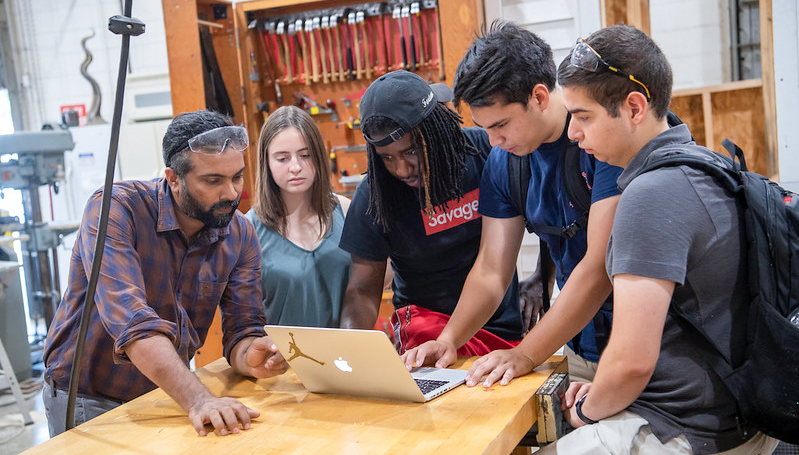Air Quality Lab
The air quality laboratory contains state-of-the-art instruments for measuring size distributions of both airborne particles and particles dispersed in liquid media.

The Department of Agricultural and Biological Engineering has state-of-the-art facilities for teaching, research, and outreach in various areas. These facilities provide opportunities for hands-on research on bioprocessing and industrial biotechnology, robotics and automation, off-road equipment, waste-to-energy, hydroponics, among others.
Major facilities include the Integrated Bioprocessing Research Laboratory (IBRL), Illinois Autonomous Farm (IAF), Field Robotics Engineering and Sciences Hub (FRESH), Hydrothermal Liquefaction (HTL) Lab, Farm Research and Training Center (FRTC), Bioenvironmental Structural Systems (BESS) Lab, among others.
The air quality laboratory contains state-of-the-art instruments for measuring size distributions of both airborne particles and particles dispersed in liquid media.
Containing five environmental control chambers and three convective calorimeters, this newly remodeled laboratory is customized for animal heat, moisture and gas production measurements. The entire building is HEPA filtered and animal care certified for a wide range of research related to animal environment, animal behavior, and gas emissions.
The BESS Lab is a research, testing and educational laboratory dedicated to providing unbiased engineering data to aid in the selection, design and development of commercial agricultural products.
The laboratory for Biological Modeling, Analysis, and System Simulation specializes in biological system modeling, simulation, and analysis ranging from microscale ecosystems associated with denitrification to macroscale life support systems for future space missions.
The Distributed Autonomous Systems Lab conducts research in autonomous decision making to enable the next generation of robotic systems. Projects include development of robotic systems and onboard artificial intelligence for mechanical weeding of herbicide-resistant weeds with teams of distributed robots, development of soft robotic arms and manipulators for agricultural management, and development of field robotic systems for monitoring contested areas.
The Energy Biosciences Institute (EBI) harnesses advanced knowledge in biology, the physical sciences, engineering, and environmental and social sciences to devise viable solutions to global energy challenges and reduce the impact of fossil fuels to global warming.
The ABE Farm Research and Training Center (FRTC) is an extensive off-campus research farm facility for critical research, teaching, demonstration, and outreach programs. The farm comprises 78 contiguous acres divided into 15 plots, ranging in size from two to eight acres. On-farm facilities include 7,500 square feet unconditioned spaces that include a modern maintenance shop, classroom, environmental research facilities for poultry and swine, grain storage, a Solar Decathlon house, and three buildings for equipment and machine use.
The Illinois Autonomous Farm (IAF) unites researchers, industry leaders, educators, and stakeholders to drive research, education, and outreach for autonomous systems in agriculture across Illinois. Launched in 2020 as a joint effort between Agricultural & Biological Engineering and the Illinois Center for Digital Agriculture (CDA), the IAF is a shared testbed facility to advance artificial intelligence (AI) research for agriculture. The IAF is part of the ABE Farm Research and Training Center. Our farm provides the IAF with access to key facilities, such as a solar-powered operating station, high-speed internet, and flexibility to expand its acreage as future projects demand.
The Integrated Bioprocessing Research Laboratory (IBRL) is a state-of-the-art pilot-scale facility that accelerates the commercialization of bioprocessing technologies in renewable chemicals and fuels. IBRL features translational research capabilities and expertise to help food and beverage, biofuel, biopolymer and other industrial biotech companies from all over the world develop and improve their products and processes. The facility houses over $10 million in processing and laboratory equipment. It contains private spaces for individual projects as well as quick-connect utilities and electrical access, making it easy to move equipment and start projects quickly. The facility is also an excellent resource for student education as IBRL offers a professional science masters program in bioprocessing and biotechnology, as well as undergraduate internships.
The Storm Water Pollution and Erosion Control Research and Training Center on the university's South Farms features a 300-feet-long and 13-feet-high dirt berm with three drainage ditches that can be discharged into a small pond. Study at the research facility focuses on the processes of erosion and test how vegetation, commercial products, and other erosion control methods can reduce the degradation of soils and soil structures caused by storm water and other weather-related factors.
This laboratory develops and evaluates novel technologies for converting agricultural waste to value-added products such as renewable energy while reducing the negative environmental impacts agricultural waste creates.
1304 W. Pennsylvania Ave.
Urbana, IL 61801
Email: abe@illinois.edu